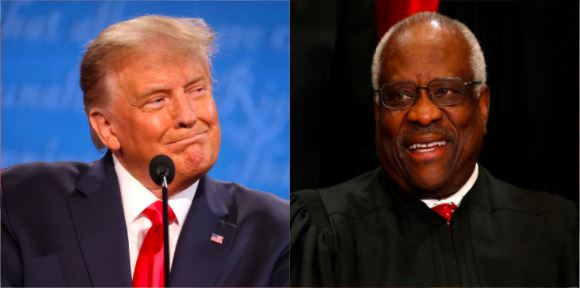Months after silencing former US President Donald Trump, big tech is facing a major setback at the hands of Justice Clarence Thomas, an Associate Justice of the Supreme Court of the United States. He has made a strong case to read down Section 230 of the Communications Decency Act- a legal provision that grants blanket immunity to tech companies from lawsuits and allows them to patrol speech on their platforms.
On Monday, the US Supreme Court vacated a lower court ruling which had described former President Trump’s act of blocking people as unconstitutional. The issue was whether “@realdonaldtrump” could be deemed a public platform and whether Trump’s act of blocking others stifled private speech. Now that Trump is no longer in office the lower court ruling is a “moot” question, with no substantive relevance. Yet, Justice Thomas has raised the more important question of Twitter’s ban on Donald Trump.
The Associate Justice argued that Twitter’s ban on Trump showed that it is the social media platforms themselves, and not the government officials using them, who hold all the power.
Justice Thomas wrote, “As Twitter made clear, the right to cut off speech lies most powerfully in the hands of private digital platforms.” He added, “The extent to which that power matters for purposes of the First Amendment and the extent to which that power could lawfully be modified raise interesting and important questions.”
In fact, Justice Thomas also questioned the statutory protection of Section 230 in favour of tech companies. As per the Associate Justice, the Twitter ban on Trump exposed the dangers associated with “applying old doctrines to new digital platforms is rarely straightforward.”
What must be really unsettling for big tech is Justice Thomas’ observation putting big tech companies at par with common carriers. He believes that some tech platforms are “sufficiently akin” to common carriers like telephone companies. He explained, “A traditional telephone company laid physical wires to create a network connecting people.”
Justice Thomas added, “Digital platforms lay information infrastructure that can be controlled in much the same way.”
It really changes the fundamental character of big tech companies if they are treated at par with common carriers. The fact remains that the First Amendment, which protects free speech in the US, doesn’t apply to private companies. But it does apply to common carriers.
Justice Thomas elaborated, “If the analogy between common carriers and digital platforms is correct, then an answer may arise for dissatisfied platform users who would appreciate not being blocked: laws that restrict the platform’s right to exclude.”
So, the issue is that if big tech companies are indeed to be treated as common carriers, then they would lose the right to moderate content and stifle the free speech of an average American.
Any provision, including Section 230 itself, might get hit by the bar of the First Amendment and create further trouble for big tech companies. Justice Thomas’ remarks suggest how Section 230 could actually be unconstitutional and compel lower court judges to read it down in specific cases that come before them.
Justice Thomas is probably one of the first judges in the world to realise the importance of reining in the excessive and unfettered powers that big tech enjoys. He wrote, “It changes nothing that these platforms are not the sole means for distributing speech or information. A person always could choose to avoid the toll bridge or train and instead swim the Charles River or hike the Oregon Trail.”
He added, “But in assessing whether a company exercises substantial market power, what matters is whether the alternatives are comparable. For many of today’s digital platforms, nothing is.”
This is a key observation in the development of jurisprudence concerning the regulation of big tech companies and social media giants. It realises how lack of options and the absolute powers of big tech are a threat to Freedom of Speech and Expression. Once, judges in other countries start taking up what Justice Thomas said as an acceptable precedent, then social media giants could end up facing deeper regulation and Constitutional restrictions on their whimsical powers to block users.








